Illegoal Gasoline Emission
Landscape Connection

High Water
Global Supply Crisis Climate Change
Flooding Landscape
LIC IBZ


Local Currency
Supply Chain
Smart City
Inaccessibility and Transit
Driverless Transport
LIC IBZ 2045
Manufacturing Trade
Local Suppliers
POLICY Technology Improvement
Transportation Connection

Community Vitality
Industrial Diversity
Economic Vitality
Employment and Secure Housing
Squatter Rights
Part III Fall 2023
From network to district: infrastructure and multiplicity M.S.AUD
Zijian(Alex) Xu Leah Carpenter ChuHan(Joshua) Tran
SCENARIO: ALTERNATIVE ECONOMY
Tram System
Transporting people, materials, and waste via trams across existing rail and street networks, supported by grant funding and material transport payments.
Local Currency for Manufacturers
Establishing a local currency to encourage flexible material movement among participating entities, stimulating economic growth and connecting private and public interests.
Strengthening Squatter’s Rights
Encouraging residence on-site to foster responsibility and belonging, prioritizing housing for factory workers, potentially linking communities via a transit hub.
Eminent Domain for Waterfront
Using eminent domain for acquiring waterfront property, transforming it into floodable plains, parks, and plazas while promoting communal bioremediation in exchange for housing.
Resource Support for Worker-Owned Factories
Providing resources to worker-owned factories on neglected sites in exchange for contributions toward various urban renewal initiatives.
MOBILITY


PUBLIC SPACE

2025 2030 2045
Commercial Government Worker Worker Worker Enterprise Enterprise Enterprise Government Government Commercial Commercial Startup Start-up Community Community Residential Artist Skill Training Tax
Funding Skill Training Transportation Tax Funding Skill Training Transportation Tax Funding Skill Training Transportation Tax
Part III From network to district: infrastructure and multiplicity ALEX, LEAH, JOSHUA




Long Islanad Expy Residential Newtown Creek Railroad/Bridge Waterfont Park Community Public Space Mobility Hub Factory Renovation (Govern Owner) Factory Renovation (Worker Owner) Vertical footpath Railroad Architecture Parking Lot Long Island Expy Park Newtown Creek Abandon Railroad Site Boundry
Mobility: Tangible System
Abandoned railroad reuse: Vertical pedestrian transportation system & material transportation system
Inspired by similar systems in Germany and using decommissioned tracks, trams may transfer people, materials, and waste around the site. As the system is pressured to grow, it may expand to rail lines currently in use for co-current transit options.
To accomadate an increased number of residents and laborers on the site, the tram can use lines from Queen’s formerly extensive street car network, currently buried under Hunters Point Ave.
5Years

Policy Impacts and Users

20Years
Manufacturers public and private mobility adaptive reuse
The future of freight is small and to adapt to those trends manufacturers must explore new options for transit. This system will increase access to site for their labor force as well.
Laborers
Factory workers are essential to this transit system. They will decide where it needs to go, when it runs, and what/who it will transport.
Suppliers
Freight suppliers tend to rely on trucks for most shipments. As they become more climate consious, this system will be a feasible alternative.
From network to district: infrastructure and multiplicity
Part III
ALEX, LEAH, JOSHUA
Mobility: Intangible System
Establishing a local currency among manufacturers, similar to IthacaHours or BayBucks, aims to spark economic activity and exchange.
Using this type of currency, manufacturers are encouraged to move their supplies as needed to other factories, firms, or institutions participating in this economy.
An increased flow in materials across the site will create new connections between private firms as well as public and non-profit organizations.

Part III
From network to district: infrastructure and multiplicity ALEX, LEAH, JOSHUA Factory Factory Factory Local Company Local Company Local Community Local Community Local Artist LIC Credit Union Storage Surplus Material Surplus Material Surplus Material Active Public Space Active Public Space Artwork Support Support Government Build Housing Build Housing Local Currency Local Currency Local Currency Licensing Technology Funding Aggrement Organizational Structure 5 Years 10 Years 20 Years
Local Currency for Industrial Sites
Public: Accessable Waterfront
Publicly Accessable Waterfront
Use eminent domain to acquire waterfront property, prioritizing abandoned or dilapidated parcels Land along waterfront will be used as floodable plain, including parks and plazas
Activities in these areas can encourage communal bioremediation and cleanup, maybe in exchange for housing elsewhere on site
First parks, plazas complete, use of eminent domain to acquire remaining parcels. Begin communal 5 Years
5Years Government bids for private parcels on waterfront, conversion into parks, plazas

Policy Impacts and Users

20Years
Land Owners Earth Residents land stewardship climate change
There is a complete lack of public open space in Long Island City including on the site. Residents from both areas will seek out and use these spaces as they become available.
Almost all buildings on the waterfront of the site are in the floodplain. These properties may quickly loss value as sea levels rise, and using these land for public good will benefit all.
Returning the waterfront to more natural state will protect development further inland and help remediate the damages of past industries.
Part III
network to district: infrastructure and multiplicity ALEX, LEAH, JOSHUA
From
Public Space: Bottom-up community governance
Strengthen Squatters Rights
Inviting people to live on site will help create a sense of belonging and responsibility for the land.
May offer tax incentivization structure for absent property owners to allow squatting provided minimum liveable conditions by owners.
Factory and other laborers may receive first priority for housing.
Community may connect to Flex Factory via Sunnyside Yards Transit Hub.
5Years Squatters move onto city owned parcels, private Absent landlords fix up their building in exchange for tax break, factory workers move in rent free

Policy Impacts and Users

20Years
land stewardship
As the price of housing becomes increasingly unaffordable for blue collar laborers, housing on site are important. This retains a labor forces and creates belonging on the site
As a temporary population, students may be the ideal residents for living in temporary and informal spaces. As young and expressive people, this will be a place for them to flourish. Immigrants
Many immigrants and their families are entering NYC, and these numbers may increase. Establishing an informmal community will be important for setting down their roots
Part III
network to district: infrastructure and multiplicity ALEX, LEAH, JOSHUA
From
Students Factory Workers and Family
housing











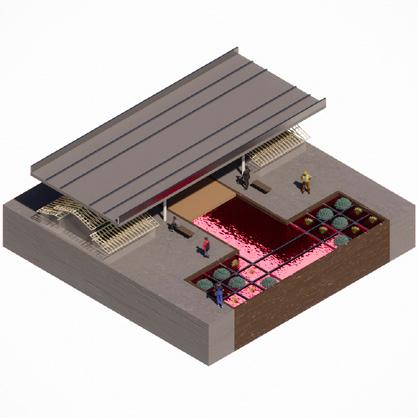



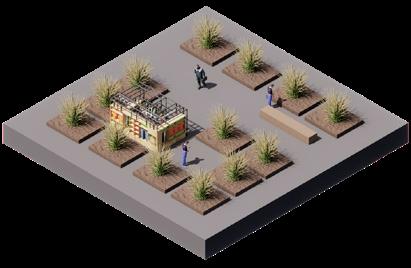









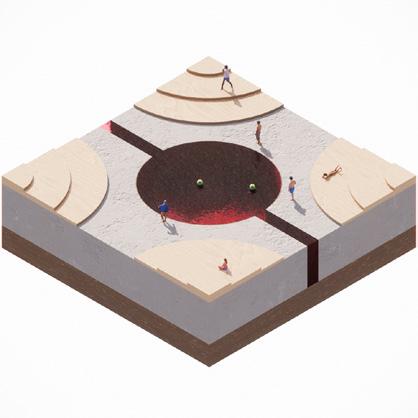






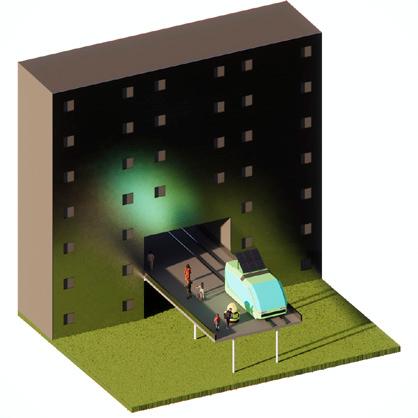
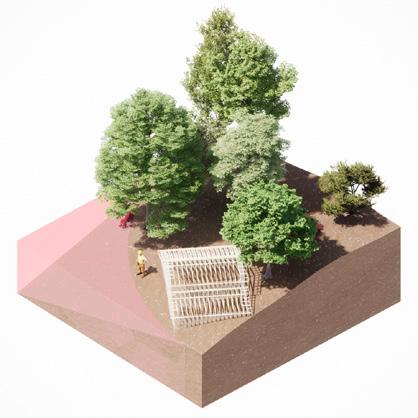







PUBLIC SPACE PUBLIC SPACE WATERFONT LANDSCAPE Part III From network to district: infrastructure and multiplicity ALEX, LEAH, JOSHUA RESIDENTIAL RESIDENTIAL SEMI-PUBLIC SPACE TANGIBLE MOBILITY
Strengthening Squatter’s Rights Tram System
Local Currency for Manufacturers

Eminent Domain for Waterfront Resource Support for Worker-Owned Factories
Part III
network to district: infrastructure and multiplicity
From
ALEX, LEAH, JOSHUA




























































